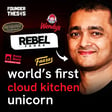
A Techie’s Tale Of Spirituality | Prashant Sachan @ AppsForBharat
Bhakti and Bharat are inseparable. Finding its root in Sanskrit, Bhakti means spirituality and encompasses community, mental well-being, and philanthropy. Being a uniquely Indian concept, the market for this space remains hugely untapped.
Prashant is an Internet entrepreneur who created a spiritual-tech app to serve the emerging devotional needs of Indians. He tells Akshay Datt about his journey of building this engagement lead consumer platform.
Know about:-
- Finding cofounders for the first venture
- Genesis and evolution of Trell
- Model of AppsForBharat and the flywheel of growth
- Community features and virtual darshan
-----
If you want to be a podcaster, then check out Zencastr.com which is also the generous sponsor for this episode. Zencastr is like a Shopify for podcasters taking care of all your needs from recording to editing to hosting.
Show your love for this show by using this link to sign up: https://zen.ai/founderthesis



















